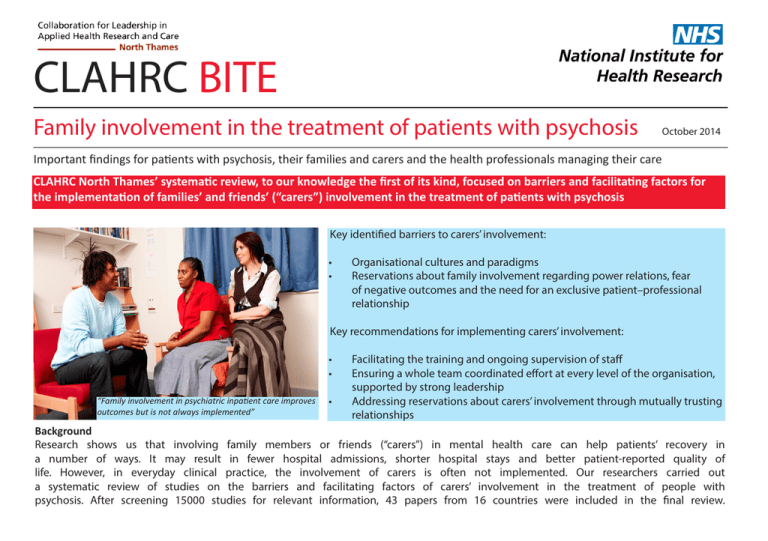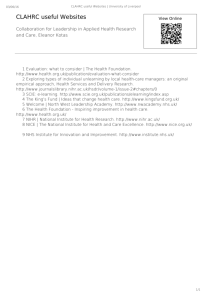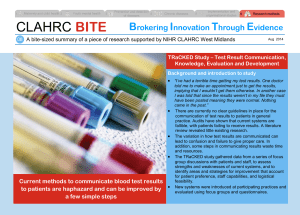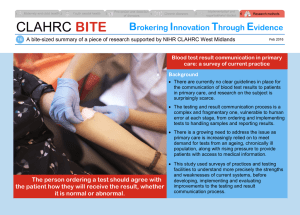CLAHRC BITE Family involvement in the treatment of patients with psychosis
advertisement

CLAHRC BITE Family involvement in the treatment of patients with psychosis October 2014 Important findings for patients with psychosis, their families and carers and the health professionals managing their care CLAHRC North Thames’ systematic review, to our knowledge the first of its kind, focused on barriers and facilitating factors for the implementation of families’ and friends’ (“carers”) involvement in the treatment of patients with psychosis Key identified barriers to carers’ involvement: • • Organisational cultures and paradigms Reservations about family involvement regarding power relations, fear of negative outcomes and the need for an exclusive patient–professional relationship Key recommendations for implementing carers’ involvement: • • “Family involvement in psychiatric inpatient care improves outcomes but is not always implemented” • Facilitating the training and ongoing supervision of staff Ensuring a whole team coordinated effort at every level of the organisation, supported by strong leadership Addressing reservations about carers’ involvement through mutually trusting relationships Background Research shows us that involving family members or friends (“carers”) in mental health care can help patients’ recovery in a number of ways. It may result in fewer hospital admissions, shorter hospital stays and better patient-reported quality of life. However, in everyday clinical practice, the involvement of carers is often not implemented. Our researchers carried out a systematic review of studies on the barriers and facilitating factors of carers’ involvement in the treatment of people with psychosis. After screening 15000 studies for relevant information, 43 papers from 16 countries were included in the final review. Summary of findings Carers’ involvement can only be implemented if this is considered a shared goal of all members of a clinical team and/or mental health service, including the leaders of the organisation. This may require a cultural and organisational shift towards working more widely, involving not only patients but also their families and friends. Recommendations for practice Our results suggest that having ‘top-down’ support and training some staff members to carry out family work is necessary but not sufficient. In order to effectively implement carers’ involvement in treatment, all members of a clinical team should be trained and regularly supervised and a ‘whole team approach’ should be used. Otherwise, the practical burdens of working with carers (such as the extra time it takes) can be too difficult for individual staff members to overcome. This can result in the work not happening at all, or not being carried out in the best possible way. Developing a clear structure for staff, carers and patients to follow can be beneficial. However, there should be flexibility to accommodate individual needs. Concerns emerged regarding privacy, power relations, fear of negative outcomes and the need for an exclusive patient– professional relationship. Exploring and acknowledging such concerns through open, yet nonjudgemental communication could facilitate positive relationships between staff, carers and patients. References Implementing family involvement in the treatment of patients with psychosis: a systematic review of facilitating and hindering factors Erica Eassom, Domenico Giacco, Aysegul Dirik, and Stefan Priebe BMJ Open. 2014; 4:e006108. Abstract: http://bmjopen.bmj.com/content/4/10/e006108.abstract Full text: http://bmjopen.bmj.com/content/4/10/e006108.full Useful links NIHR CLAHRC North Thames Project Involvement of carers in acute treatment of patients with psychosis: http://clahrc.azurewebsites.net/involvement-of-carers-in-acute-treatment-ofpatients-with-psychosis NIHR CLAHRC North Thames Research Theme Empowering mental health service users and families: http://www.clahrc-norththames.nihr.ac.uk/empowering-mental-health-serviceusers-and-families About NIHR CLAHRC North Thames NIHR CLAHRC North Thames is a collaboration between world leading universities, the NHS, local authorities, patients, the public, industry and charities. Our aim is to improve health outcomes and reduce inequalities through world class applied health research. http://www.clahrc-norththames.nihr.ac.uk/ Follow CLAHRC North Thames @CLAHRC_N_Thames A bite-sized research summary produced by NIHR CLAHRC North Thames Disclaimer: This research was funded by the National Institute for Health Research (NIHR). The views expressed are those of the authors and not necessarily those of the NHS, the NIHR or the Department of Health. View more BITEs at www.clahrcpp.co.uk





